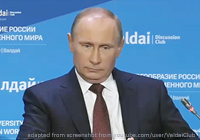New Cold War Chills Annual Kremlin Gathering of Foreign Experts

(Bloomberg – bloomberg.com – Marc Champion – October 26, 2016)
The new Cold War is starting to look a lot like the old one, and Russian and U.S. foreign-policy experts at an annual gathering with Kremlin officials this week appear out of ideas on how to even start defusing it.
The risk that the world’s two nuclear superpowers might “sleepwalk” into a hot conflict is causing a rare degree of alarm among the specialists from across the U.S., Europe and Asia brought in for the Valdai Club’s week of discussions with Russian analysts and senior officials.
One senior official told of a Cabinet meeting where President Vladimir Putin reported on a “high risk” incident in which his military jets buzzed the U.S. Navy in the Black Sea. When some at the table cheered with phrases like, “they deserve it,” Putin shut them down, saying, “are you crazy?” according to the official, who spoke on Valdai’s traditional condition of anonymity.
The story, told in response to a question about why Russian state media have been stoking talk of war in recent weeks, highlights the difficulty of penetrating the thinking inside the Kremlin. It also fits a long tradition of Putin’s supporters arguing that the former KGB agent is a relative moderate by Moscow standards.
“He was trying to say that Putin is not a radical and is keeping a balance with those who are more advanced in pushing for action,” said Fyodor Lukyanov, chairman of Russia’s Council on Foreign and Defense Policy. Putin is due to address the Valdai gathering, held in a ski resort built for the 2014 Sochi Olympics, on Thursday.
War Fears
Yet to those at the meeting, the story was illustrative of the way the potential for war — unimaginable just a few years ago — is back on the table.
“The current situation is just like that in the 1960s, when the world was on the brink of war,” said Sergei Karaganov, the hawkish doyen of Russia’s foreign-policy community. “The possibility of war is definitely there, which could be triggered by minor mistakes.”
Robert Legvold, emeritus professor of political science at Columbia University in New York, called it “an extremely dangerous situation, what I call sleepwalking.” He described the current tensions as similar to the early Cold War years of the 1950s and 1960s, with their multiple crises over Berlin, Korea and Cuba. The difference today is that both sides now have much larger, fully developed nuclear arsenals they are upgrading on the pretext of replacement, he said.
Those views are “alarmist, but not too alarmist,” said Lukyanov of the Council on Foreign and Defense Policy. “There is risk.”
For the Russian side, the recent collapse of a cease-fire attempt in Syria was a watershed, he said. Until then, no matter how ill-tempered the U.S.-Russian relationship, the ultimate goal had been to cooperate in finding solutions, he said. Now, as during the Cold War, the main ambition is simply to avoid direct combat between U.S. and Russian forces. Of course, the new standoff lacks the ideological rivalry that characterized the previous one, as well as the global quest for influence by the competing superpowers.
Detente Hopes
The best the two countries can hope to achieve for the next five to eight years is to establish agreed rules that avoid any inadvertent escalation, similar to the years of Cold War détente, an informal lunch of U.S. and Russian participants concluded.
The Valdai Club has for 15 years been a state-funded forum at which Russian analysts and officials — including Putin — have sought to explain their positions and improve Russia’s international image. But the event has changed dramatically over the years, both in the style and intended messages. Whereas in 2009, participants spent two days of a 10-day meeting closeted on Siberian river boats for earnest discussion (the vodka was free, though not water), the event is now much shorter and more controlled.
If there was any single message to this year’s meeting, it was a collective shrug of the shoulders. “The mood has changed,” said Lukyanov, who is also the Valdai Club’s research director. “Now it is that we are still willing to explain if you are willing to listen. If not, too bad.”
There is likely to be some kind of new outreach toward Moscow after the election of a new U.S. president in November, said Angela Stent, a former U.S. State Department and National Intelligence Council official and now a Georgetown University professor. But she said the U.S. should give up efforts to reset the relationship until the other side is ready to move. Presidential frontrunner Hillary Clinton’s forceful criticism of the Kremlin during the campaign suggests she could take a harder line than the current administration.
Russia Misunderstood
An important reason why the Russian side appears inclined to give up is the high level of unpredictability in the U.S. and Europe, from the possibility of a Donald Trump administration in the U.S. to the fallout from Brexit and the immigration crisis in Europe, said Andrey Kortunov, who like Lukyanov is one of Russia’s more Westward-looking security analysts.
“Who knows what kind of West we will be dealing with in two years’ time?” he asked.
Kortunov said recent nuclear saber-rattling by Russia has been misunderstood by Western governments and media. One of many reasons why the new Cold War is different from the old, he said, is the extreme asymmetry in conventional forces, with the U.S. and its allies stronger that they used to be, and Russia much weaker than the former Soviet Union.
Russia, he said, will continue reminding the West of the one area in which it has parity, its nuclear arsenal.
Article ©2016 Bloomberg L.P. All Rights Reserved. Article also appeared at bloomberg.com/news/articles/2016-10-26/new-cold-war-chills-annual-kremlin-gathering-of-foreign-experts
[featured image is file photo]
